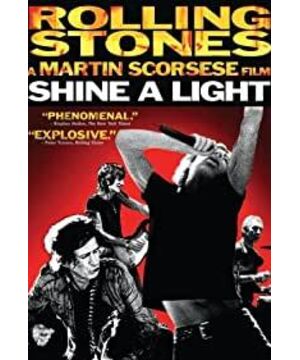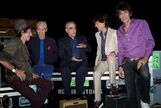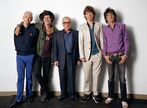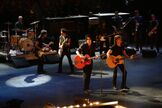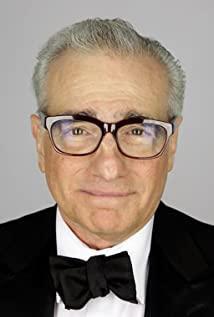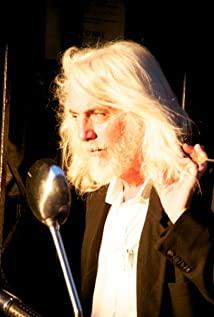"By this time the Rolling Stones had become one of the nomenclatures of the rebel spirit of the late 1960s, and it had become a symbol of drug abuse. So the police were given permission to search Charl Chads' farm. February 1967, while the band was celebrating , the police began a search and found a modest amount of marijuana. This search became part of the myth of what would become the Rolling Stones. The search also became the starting point for many later made-up stories. These stories revolved around the band's friend, Marianne Fey. Sfall's image and attitude, in fact these made-up stories were just used to expand the band's reputation. Richards was charged and was tried months later for allowing drugs to be used in his home. Jager possessed amphetamines without a prescription The pills were charged. Both were found guilty. There was a lot of media interest in the legal process. Richards was sentenced to one year and Jaeger was sentenced to four months. The Times wrote an article criticizing this The editorial of the verdict. In the editorial, titled "Who's Who?" Editor William Rhysmore wrote: "
If we want a verdict to represent the struggle between good British tradition and a new hedonism, then We should ensure that good British traditions include tolerance and equality.
It was during this high-profile event that the Rolling Stones record label released a record in the United States named Flower (Flower, in British slang for It's marijuana), although the record is a collection of only popular songs and songs that haven't been recorded in the past, it still sells very well.
Just days before Richards and Jaeger are going to jail and appeal they Also recorded a "fantasy" record. Jaeger hoped the record would be an answer to the Beatles' "Sgt. Pepper's Lonely Hearts Club Band". The record, later titled "The Devil's Majesty's Demand", was not well received, as the music on it was very incompatible with the band's original style. Richards later called the record "crap" in an interview. But there are some pieces on this record that show Richards and Jaeger refining their creative skills even further. The original band leader Jones' contribution on this record is very small. Jones' influence in the band also diminished, while Richards and Jaeger's influence grew.
Tensions grew between Jones and Richards in 1968, when they published Beggars Banquet, a return to the black music of their beginnings. While internal feuds Jaeger and Richards were writing some of their most memorable songs, including "Street Fighter" and "Sympathy for the Devil," which altered the sound of nylon-string guitars, commented during this time The family began calling the Rolling Stones "the greatest rock band in the world." Their music is rooted in blues, but incorporates changes and influences from the 1960s, incorporating elements of Bob Dylan and the beginnings of Cream and Jamie Hendrix's Heavy Rock . Contrary to these precedents, the Rolling Stones' music lacked a hippie element. The "free sex" gesture in the Rolling Stones' music is a dirty word. Two other events changed the Rolling Stones' music. Richards first learned to play the guitar with Ry Cooder. He later said, "I've learned everything I can from Ry Cooder. Second, Jag and Richards made friends with Gram Parsons. Parsons taught the pair of country music he grew up with. But the Rolling Stones and Parsons shared more than just music. Richards later said, "We all love drugs, we love the highest quality."
But drug abuse made Jones increasingly unreliable, and he tended not to participate in recordings. He was kicked out of the band in May 1969 and replaced by Mick Taylor, who had played for John Mayer. Taylor is a jazz-influenced guitarist. But Jones was found dead in his swimming pool just days before the Rolling Stones were due to perform in London's Hyde Park. Jones' cause of death was ultimately not fully deciphered. There were conflicting reports from the people on the scene, most likely he drowned. Even so, the concert was held. Thousands of spectators attended. Jaeger recited Shelley's "Adonis" and released a swarm of butterflies as a memorial to Jones. But the performance of the concert was quite confusing due to the narcotics inhaled by the band members. Shortly after the concert, the band released their successful song "Nightclub Girl", which was recorded with Jones playing guitar, but his playing was partially replaced by Taylor's before its release on July 3, 1969. "Let the Blood Flow" was published and soon became another Rolling Stones classic. Slowly meditative "Give Me Asylum", "You Can't Always Get What You Want" and another variation on Robert Jensen's "Useless Love" that went back to their roots were also published. Then the band immediately went to the United States to perform. The Rolling Stones were now rock and roll aristocrats, able to perform the hedonism they represented on their tours.
To recreate the atmosphere in Hyde Park and as a reflection of the Woodstock Festival, the culmination of the tour is planned to take place at an abandoned speedway 40 miles outside of San Francisco. The entire concert was policed by the Hells Angels, which became a disaster due to its poor organization. Fights broke out between the audience and the police, while the band continued to play on stage. A black youth who unwisely carried a gun was beaten to death by the vigilantes while the band played "Under the Thumb." It was later rumored that he was killed while playing "Sympathy for the Devil," but in fact this legend is incorrect.
The murder, which occurred shortly after Jones' death, hit Richards hard. His response to this was to indulge in more and more heroin to forget his worries. Over the next ten years he spent much of the drug addiction, sometimes going to private clinics to try to get rid of drugs, but then he became addicted. Rolling Stones concerts are getting harder and harder to organize. Police and custom officials have imposed increasingly harsh conditions on them. Richards himself said his drug addiction never affected his stage performances. (But the video of the concert, including him falling asleep on stage in 1976, shows the opposite.)
The 1971 release of "Small Thief" was the first to be released under their own Rolling Stones recording label, "The Little Thief". Let the blood flow" continues. These include the rock-and-roll "Brown Sugar," the country-esque "Mustang" (Parsons vs. Jaeger over who wrote the song), the amorous "Moonlight Mile" and Faithful's "Sister Morphine" , the song reflects her own heroin addiction. Mick Taylor works with Jager the most on this record, as Richards' drug addiction often keeps him from working. The slow "Can't You Hear Me Knockin'" reflected Taylor's influence. But all the songs are still published under the name Jager/Richards, which of course makes Taylor very dissatisfied. "
Shine a light was filmed in New York in 2002. It was a small concert in which the Rolling Stones satisfied the Clinton family and compromised by giving away tickets. Great director Martin Scorsese filmed it on the spot. The Rolling Stones' playing skills gradually perfected, the film opened, the director A dramatic line is set up: that is, the contradiction and differences between the director and the band. Under the camera, Martin does not even have a direct dialogue with Jagger, and the situation is more obvious. Clinton introduced the band at the beginning of the concert, and the band please come on during the performance. Guests, the overall process is relatively high, and the interviews interspersed in the middle are unique. For example, after the lead singer Jagger was detained, the media invited the priest and professor to discuss drug and social issues with him, the interviews the band members received in various countries, the host's comments There are also many strange problems.
The overall style of the concert is quite noisy. But the famous country songs that Keith sang on the spot instead of Jagger made the audience warm. A French program once interviewed Keith: What kind of questions do you hear the most?
Keith thought about it For a second, answer: "That's the question"
View more about Shine a Light reviews


